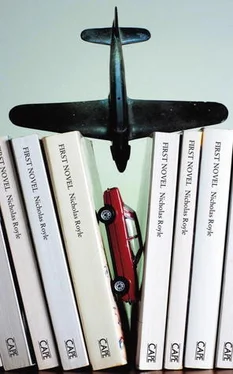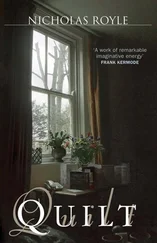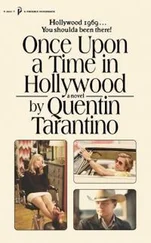I’ll drive home past Elizabeth Baines’ house, past the second-hand bookshop, through the centre of the village, where I’ll see Umbrella Lady waiting at the lights for the green man to appear so she can cross over and begin the long, slow trek down School Lane. I’ll park outside my house and sit in the car for a few minutes listening to the ticking of the cooling engine and looking at the front of the house. Staring, really; watching, gazing. Thinking, calculating. The front door will close behind me. I’ll look in the kitchen and see the red model aircraft standing on the kitchen table. I’ll walk upstairs and enter my bedroom. Expending considerable effort, I’ll pull the bed away from the wall into the middle of the room. I’ll do the same with the chest of drawers and the wardrobe, rucking up the carpet. I’ll be sweating by the time I stand back and survey my work, trying to summon up ghostly diagonal lines coming up through the floor from the four corners of the house. In the bathroom the adjustable feet of the wooden cabinet will squeal in protest, leaving dirty marks on the tiles. I’ll look at the fixed items ruefully — the bath, the toilet, the washbasin. Will I have to stop using them, make do with the toilet in the cellar? I’ll run upstairs, to my study, where I’ll find Cleo curled up on my Herman Miller Aeron chair. I’ll kneel down on the bare floorboards next to the chair and stroke her sleek black fur and very soon she’ll start purring. And then I’ll stand up and grab hold of my desk and yank it away from the wall. Power cables will reach their full extent and drag various pieces of kit on to the floor. I’ll gather them up and stuff them under the desk in the middle of the room. I’ll start pulling the books off the shelves and stacking them on the floor next to the desk and then I’ll take hold of the Herman Miller chair and lift it up on to the desk. I’ll climb up on to the desk myself and then, taking care to keep the chair steady, I’ll lever myself up on to the chair. Cleo will shift resentfully, so I’ll gather her up into my arms as I balance on the chair and I’ll ask her if she knows who else has one of these chairs and she’ll say, Geoff Dyer, Alain de Botton, Francesca Simon and Siri Hustvedt, and I’ll say, That’s right, Cleo, that’s right. Good girl. And then she’ll wriggle out of my arms and like a streak of tar she’ll leap down to the desk and then on to the floor and she’ll run out of the door, leaving me, crouched on the chair, alone, lifting my head to the pyramid roof.
In the end, I walk on through the tunnel under Didsbury Road. I cross Green Pastures and join the path down to the river, where I turn left. Above the power lines, a medium-size jet is making its final approach to Manchester Airport, undercarriage down, ready to land. The branch is still in place. Without moving it, and making sure first that no one is coming from either direction, I find more fallen branches from the other side of the path, where, beyond the pylon, there is a nature reserve. I lay these down over the makeshift grave to create more of a barrier to inquisitive dogs and then I walk back along the river towards Parrs Wood. I turn right up the path between the playing fields and the golf course. I cross Green Pastures and head back down on to the trackbed of the dismantled railway line.
When I get home I write an email to Grace suggesting we meet. The cursor hovers over the send button. I reread it and click back in the body of the email instead and rewrite it, asking if we can meet, doubting that she will agree or even get back to me. I hit send.
I open the folder marked ‘Novels’ and reread the last few thousand words of my work-in-progress to see if I can get going again, but I can’t. I check my emails to see that nothing has arrived. I take out my phone and call the university and get Grace’s contact details. She lives in West Didsbury, less than a mile away. I key in the number, but there’s no answer and apparently no voicemail service. I send her a text. I check my emails again.
I leave the house and walk for five minutes to a quiet street just around the corner from Lewis’ house where there are always a couple of minicabs sitting waiting for jobs. I ask one of the drivers to take me to Stockport. He says he’s not insured unless the job is booked through the office. I shake my head and walk to the other car and repeat my request and get the same response. So, I pull my phone out of my pocket and call the number of the cab firm. The controller asks where I want to go and I tell him and he asks me where I am and I tell him that too. He tells me his drivers can’t pick up passengers on the street, so I ask if they can pick me up from the address of the house outside of which we’re standing and he says, No, that’s not where you live, that’s just where you happen to be standing. So I say, Right, and give him Lewis’ address and ask to be picked up from there. He asks when I want to be picked up and I say in two minutes. He says, Sure, no problem, and I hang up. I give the driver of the cab a humourless smile and walk to the end of the street and turn right. After a hundred yards I reach a house covered in scaffolding and walk up the drive. The windows are dirty and it’s hard to see inside, but the place looks dead. By the time I’ve turned around to face the street, the cab has arrived and is pulling up at the side of the road. It’s one of the two cars from around the corner. I walk back down the drive and open the rear door and the driver says, Hiya mate. Stockport, yeah? And I say, Yeah.
Throughout the journey I check my phone for texts and emails and I look out of the window. When I see the Pyramid sliding into view I ask the driver to let me out. He says, What, here? And I say, Yes, here. I pay him and get out. I cross Didsbury Road and make my way towards the system of footpaths and subways that negotiates the roundabout suspended over river and motorway. I pass close to the Pyramid and think about scaling the fence and seeing if I can get inside, but I’m not sure there’s much point. Instead I walk on and eventually reach the spot where I left the car. It’s still there and no one has clamped it or taken a half-brick to the windscreen. I get in, start the engine and drive back to the roundabout, giving the Pyramid another look as I get on to Didsbury Road and head for home.
I leave the car outside my house and walk over to West Didsbury. The address I’ve been given for Grace is on one of the roads that run from north to south between Lapwing Lane and Barlow Moor Road. These are narrow roads with cars parked on both sides; tall, narrow Victorian houses mostly divided into flats. I stand outside hers and look up at the windows, which give nothing away. Because of the age of the house, any windowsills on the inside will be too shallow for anything to stand on — plants, ornaments, a row of books — that might reveal something about the residents. In the front room of the raised ground-floor flat I can see men’s shirts on hangers hooked over the picture rail.
There is a strange fluttering in my stomach, an odd lightness contrasting with a heaviness somewhere higher up. It’s so long since I’ve felt anything like this, I don’t recognise it. It feels alien to me. But it feels . It is a feeling .
I walk up to the door and ring the bell for flat C. I hear a faint, intermittent buzz somewhere in the house, presumably the top floor, but that is all I hear. I press it again, but there is no response. I step away from the door and return to the street. I look back up at the windows, but there is nothing to see.
The feeling inside me has not gone away.
I walk through the streets. Leaves are beginning to fall; they form wide circles on the road and the pavement below the lime trees that line Parkfield Road South. I don’t know what time it is when I’m finally standing outside Lewis’ house, but the light is different: there’s a softness to it, an amber hue, a sense of liquidity. It feels as if the world could become trapped in this moment. My hand lifting the door knocker, striking the door, once, twice, three times. Lewis doesn’t answer. I peer through the stained glass, but it’s hard to see anything clearly. The windows of his front room are streaked with dirt. I knock again and a moment later find myself pulling open the garage door, which scrapes on the tarmac. I slip into the garage and move past some bits of old junk to reach the side door, which is unlocked.
Читать дальше












